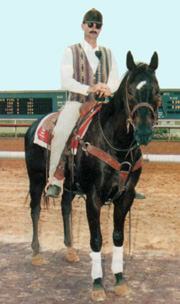 Outrider: A range rider; a cowboy who rode his employer’s range far and yon to spot trouble. – Dictionary of the American West by Winfred Blevins
Outrider: A range rider; a cowboy who rode his employer’s range far and yon to spot trouble. – Dictionary of the American West by Winfred Blevins
They don’t look like cowboys, with their riding helmets, walkie-talkies and waistcoats. But make no mistake, racetrack outriders could throw in with the best of them. Some of these unsung heroes are former rodeo performers; some former jockeys or trainers. But as outriders, they are a jockey’s best friend.
Race fans rarely notice outriders because most of the time these mounted racetrack employees are out of the line of action, along the outside rail. They only come into focus as first responders, if a horse or rider is in trouble on the track during races and morning workouts.
Several years ago, I spoke with outriders Grady Likes and Jack Bruner (pictured) about the demands of their work during the summer race meet at Lone Star Park in Grand Prairie, TX.
“You’ve got to have a cool head and have confidence that you can take control of any emergency situation,” said Likes. “But a loose horse going the wrong way up the track is an outrider’s worst nightmare. You never want to see a horse run head-on into a field of horses.”
“The hardest part of the job is having to ride by (a fallen rider) and not stop to help,” Bruner added. “Your first instinct is to move the rider out of the way. But you have to make sure his loose horse doesn’t run into somebody and cause a wreck.”
If a horse breaks down, it is the job of the first outrider on the scene to bring it to the ground, if necesary, and keep it immobilized until more help arrives. The four outriders at Lone Star Park position themselves along the outside rail, taking into consideration the distance of each race. They are in communication via walkie-talkies.
The day before I spoke with Likes and Bruner, a horse appropriately named Ole Bad Man had dumped his jockey in a six-furlong sprint and headed back up the track toward the oncoming field. Just as Bruner caught up to him and snagged his reins, Ole Bad Man jerked away, dragging Bruner out of his saddle.
“It was a horrible crash,” remembered pony rider Shannon White. “I saw Jack go off and hit really hard and I thought he was going to die. I’m on horses every day, but there’s not enough money to make me do what the outriders do.”
In spite of the fall, Bruner managed to hold on to Old Bad Man’s reins, while the horse continued up the track. “I held on to him as long as I could because I knew Grady would be there shortly,” Bruner explained.
As Likes drew abreast of Old Bad Man and grabbed the runaway’s bridle, he too was jerked off of his horse. Old Bad Man had already dragged Bruner 50 yards, but with both Bruner and Likes as anchors, he finally came to a halt, and the two men jumped back on their horses and hustled him off of the track.
“When you have one of those wrecks, you don’t have time to be scared,” said Likes, a former bronc rider and steer wrestler. “It’s not something you think about, because it’s over with before you know it. But we keep an eye on each other. It’s easier to catch a loose horse if there are two of us. We have a plan and know what the other guy is going to do.”
An outrider is only as good as his mount, and each rider takes pride in the horses that he provides for the job. The breed of an outrider’s mount is a matter of personal preference. Bruner likes former race horses, while Likes prefers ranch-trained Quarter Horses.
“It takes a unique horse, so when you find one, it doesn’t matter what he is,” said Likes. “By the time we ride them back and forth with every race, those horses probably go ten miles. A racehorse in training only gets a mile and a half or two miles, so our horses are more fit than the ones that they’re chasing.”
Likes’ favorite mount was a gelding he called Sonny. “When he’d catch a loose horse, he’d bow all up,” he recalled. “He was proud of himself. I didn’t have to tell him when to go or what to do, all I had to do was sit on him. He taught me a lot about catching horses because he rated them himself. He’d run real hard until I’d catch them, then he’d slow down.
“I have another horse that is the dumbest animal I’ve ever owned,” he added. “But he’s also the most loyal. When I got jerked off of him (at Lone Star Park) and got back up, he nickered and came jogging up to me. He loves me and he tries as hard as he can. I have to tell him what to do, but if I asked him to run through a wall, he’d just close his eyes and duck his head and go for it.”
Because of their love for horses and in spite of the pressures of a fast-paced, dangerous job, outriders rarely suffer from occupational burnout. “I wouldn’t trade my job for anything,” said Likes. “It’s like getting to play Superman for eight hours a day.”
